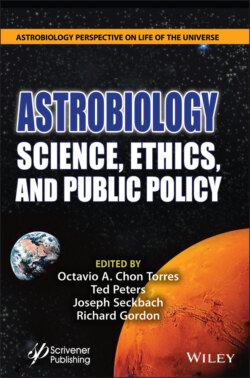Читать книгу Astrobiology - Группа авторов - Страница 41
2.3.10 How Do We Protect Earth from the Sky?
ОглавлениеEven with colonists migrating from the third to the fourth planet, the vast majority of earthlings will remain living on Earth. Earth will continue to be our home for the foreseeable future. The ecological-ethical mandate is clear: if we Homo sapiens do not get our act together we’ll go extinct before Martian microbes will.
Earth is a dangerous place to live. The heavens threaten. The Sun occasionally launches solar flares, which fry electricity grids by generating intense currents in wires. More rare than solar flares but equally potent are blasts of radiation from a nearby γ-ray (gamma ray) burst. A short-hard γ-ray burst, caused by the violent merger of two black holes or two neutron stars or a combination, provides the most frightening scenario. If one such blast would be directed at Earth from within 200 parsecs away (less than 1% of the distance across the Milky Way), it would zap Earth with enough high-energy photons to wipe out 30% of the atmosphere’s protective ozone layer for nearly a decade.
There are more threats coming from Earth’s heavens. Comets and asteroids, when large in size, can explode on Earth’s surface with the impact of a nuclear bomb. It is widely believed among scientists that sixty-five million years ago an asteroid ten kilometers in diameter hit Earth and triggered the mass extinction of dinosaurs. Can we protect Earth from future asteroid catastrophes? The UN’s Science and Technical Subcommittee’s Near-Earth Object Working Group and its internal panel, Action Team 14, have been working on the details of an international approach since 2001.
The astroethical response to possible and probable futures is to prepare. These damage scenarios lead us to think ahead. We need to plan for our planet’s future, and we need to incorporate such possibilities into our planning. With regard to solar flares, fortunately, there are ways to mitigate the damage should it occur: engineers can protect the grid with fail-safes or by turning off the power in the face of an incoming blast. With regard to a comet or asteroid strike, we will be given advanced notice. A diversion strategy could be effective, perhaps by hitting the object while it is yet far away with a nuclear bomb. We have no way to prevent gamma ray bursts from striking our Earth, but we could provide protective shields in sanctuaries for life forms we wish to restart following the event. These matters belong to our quandary. Just how will we respond?
